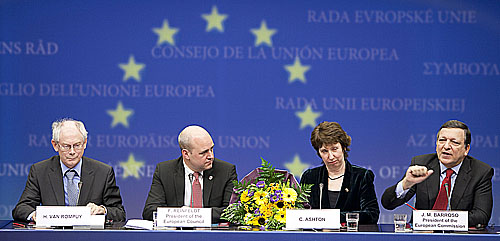|
 |
|
COURTESY OF STANLEY CROSSICK | The year 2009 was a difficult one for the European Union (EU). The European Parliament elections, held in June, are always disruptive. The results were disappointing with a low turnout and many eurosceptics elected.
The uncertainty of the Lisbon Treaty's coming into force was an overhanging cloud for most of the year. The obstacles to this were the legal process before the German Constitutional Court and two processes before the Czech Constitutional Court, the second Irish referendum in October and the refusal of the Czech President Vaclav Klaus to sign the ratification instrument. But all these issues were satisfactorily resolved and the new treaty came into force on December 1.
 |
|
TOP GUN: Belgian Prime Minister Herman van Rompuy (left) and Briton Catherine Ashton (third left) are elected the EU's first-ever full-time president and high representative for foreign affairs and security policy respectively on November 19 in Brussels (XINHUA) | The appointment of a "permanent" European Council president and a high representative of the EU for foreign affairs and security policy (foreign minister in all but name) on November 19 ended a long period of speculation and media interest. Finally, the member state nominees for the new European Commission were announced and President José Manuel Barroso, with his five-year mandate already renewed, allocated the portfolios on November 27.
Thus the year ended on a high note—but the commissioners face parliamentary hearings in January and will not take office until February at the earliest. It is expected that European Parliament will object to more than one nominee.
The EU is effectively at the end of a long period of uncertainty. This uncertainty has led to a loss of momentum and dynamism in EU developments, making the union much more reactive than proactive. Its position on the world stage has been weakened. There has also been a considerable loss of morale among EU officials. But this has not materially affected legislation: It remains remarkable how the EU manages to adopt complex legislation, working in over 20 languages.
The dark cloud is lifting, the mood is brightening in Brussels and the union is looking forward more optimistically to the year 2010.
Demarcation of roles
It will take some months for the new European Commission team, the European Council president and the foreign policy chief to settle down. Although Herman van Rompuy and Catherine Ashton took office on December 1, when the new treaty came into force, the new commission will not take office until probably February 2010, after approval by the European Parliament.
This leads to a somewhat messy couple of months with, for example, former External Affairs Commissioner Benita Ferrero-Waldner taking responsibility for trade.
Many reactions to the appointments of Herman van Rompuy as president of the European Council and Catherine Ashton as foreign policy chief have been negative. They deserve further consideration.
There is a built-in conflict between the roles of European Council president and foreign policy chief. The Lisbon Treaty prescribes for the former a chairperson with an essentially internal job. The president also ensures the external representation of the EU on issues concerning its common foreign and security policy, without prejudice to the powers of the foreign policy chief. This is hardly consistent with the treaty provision that the latter represents the EU in matters relating to the common foreign and security policy, conducts political dialogue with third parties on the EU's behalf, and expresses the EU's position in international organizations and at international conferences.
Van Rompuy appears made for the basic job specification and his character suggests that he will concentrate on increasing the efficiency and effectiveness of the European Council, and not seek to project himself on the world stage and relegate Ashton's role. Ashton will not seek to emulate Javier Solana and is expected to focus initially on building and organizing the new diplomatic corps—the European External Action Service. This task is both difficult and important. The significance of the new service will be influenced by the caliber of secondees from member states and the relationship between the service and national diplomatic corps.
Although neither Van Rompuy nor Ashton has much international experience, both have been effective in domestic politics and Ashton has done well as the EU trade commissioner. Both appointees are well suited to work closely with each other and with European Commission President Barroso. They are hardworking and are likely to be effective in agreeing a sensible demarcation of their roles.
| 